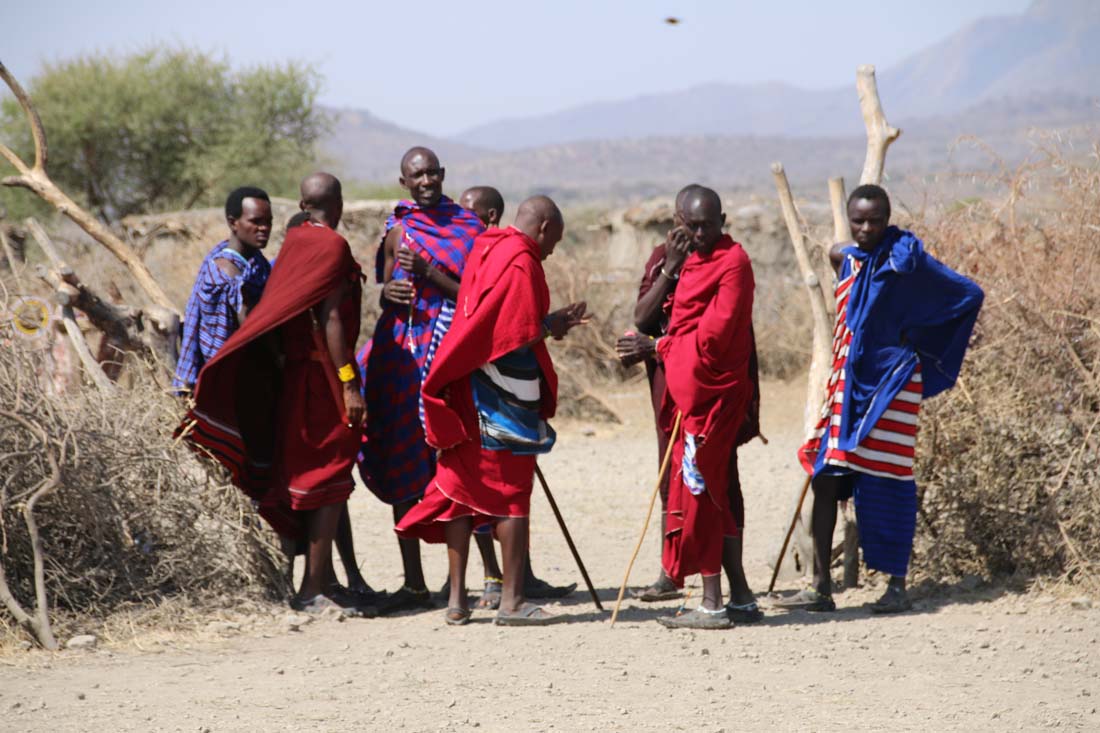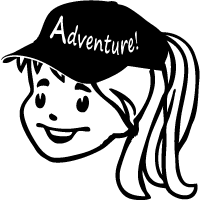 Adventuriety / Inspirietry
Adventuriety / Inspirietry
We drove for a long time today. It was the fourth day of our safari, and I was feeling a little calmer about the whole experience. We had all made it out of Tarangire alive and I even had the frivolous thought of hoping to see a Cheetah before we left Tanzania. I didn’t know it at the time but I would spend a lot of time analyzing the next forty-eight hours of the safari. It would stretch my thoughts and feelings in new directions.
We had left Oliver’s camp early with a packed lunch for the road. The plan was to game drive out of Tarangire and end up in Lake Eyasi. The attraction near Lake Eyasi is not animals, but people. We were going to visit two tribes, the Hadzabe and the Datoga. Although the distance from the gates of Tarangire to Lake Eyasi is not great, about seventy-five miles, the last two hours is on a brutally bumpy and dusty road dodging onion lorries and other large, dust belching vehicles.
I had the great idea, and I write this sarcastically because it was the catalyst of my deep thinking for the safari, of stopping at one of the bead stands that we had seen driving into Tarangire Park and browsing the wares with Ashley. We would spend twenty or so idyllic minutes trying on things and admiring each other’s choices before choosing a few to take home, engage in light and enjoyable (for both seller and buyer) haggling and then continue on our way towards Lake Eyasi. It didn’t quite happen like that.
I asked our guide if it would be possible to stop and shop for some beads. That would not be a problem he said. And then later, he said, “I think I have a good idea.” He explained that he had a Masai friend. This friend allowed him to bring his clients to visit. It would be a cultural experience and not touristy and we could buy our beads from his wives and help support his family directly. I had passed on the Masai “add-on” when planning our safari because I had heard and read that it was not an authentic experience. This “Masai friend and his village that was not touristy” experience sounded perfect. It was not perfect.
As we pulled up to the Masai huts (along with a few other safari jeeps) our guide cautioned us that as nice as these folks were, they didn’t really understand the value of our dollar and they had trouble with the exchange rate. He went on to advise not spending over $100 dollars on beads and not to pay the price that they asked. And, he reminded us, we were on a tight schedule so about twenty minutes to visit the Masai was our time allotment.
The chief, Obama, met us at the jeep and welcomed us to his home. He was charismatic and outgoing, joking in his fluent English and speaking Swahili with our guide. I don’t know how many languages he spoke, but definitely a few. He encouraged us to take pictures and he took our camera and started snapping photos of the four of us together. They tied red cloth around us, danced and sang and led us into the enclosure where the huts were positioned in a circle.
The dancing and jumping continued and it was hot outside. There was one woman who was having a hard time with the heat and jumping and I felt badly for her.
We were led into one of their huts and Obama explained how the cooking was done and where people slept. It was interesting and all the while he was talking and showing us things, he would take the camera and snap a photo at significant parts. He took good photos. Then he explained how the women made their money selling beaded items and it was their money and we would pay them, but he would translate.
He led us into his hut and showed us the shoes made out of tires that the Masai wear to protect their feet from the very long and sharp thorns of the native plants. He was selling them and blankets and some other things. He reminded us that we were on a tight schedule.
I’ll get to the point right here. We picked out about ten items from the table. Bracelets mostly and a little bowl, a tiny bowl, like palm of your hand size bowl and a small carved elephant. We chose a pair of tire shoes and a blanket from Obama’s hut. He said $220 for the shoes and blanket. Oh. We put them back remembering our $100 limit and our handful of trinkets for friends and family at home that we still wanted to purchase. We went back into the hot sunshine to learn how much our shopping would set us back. I was fairly certain that it would set us back exactly $100. At this point, Obama was not as friendly. He looked at our items and spoke with one of the women. The grand total was $300. I still had optimism in me that this is where some good natured haggling would end with everyone feeling like a fair deal had been struck.
Long story bearable; the haggling did not go well, it wasn’t even haggling. I just offended him and he started getting very pushy, tapping on his watch and telling us we needed to pay him and go. The kids watched in silence. I was irritated as well, I just wanted to shop for some beads with Ashley. I would have happily paid some random shop keeper $100 dollars for a handful of bracelets and walked away thinking Ashley and I got some pretty beads and a memorable experience in a local shop where we supported the community, but this experience had spiraled out of control. I told Obama I had $100 to spend on the items. He said no. Scott said let’s compromise. I said no. Ayoub’s voice was in my head, $100 max. I asked Scott what he really wanted. He chose the bowl and a bracelet for his mom for a total of $50, $30 for the bowl and $20 for the bracelet. I said, “You want to spend 30 on that bowl? Yes, he did. I just wanted to leave. I was so upset at this point and I wasn’t even sure why.
We bought the bowl and bracelet and got in the jeep and left. We drove away, Ayoub cheerfully asking us if we had bought any beads and if we liked the experience. I couldn’t even speak. I couldn’t talk for a couple of hours. I was so disappointed. I had an entirely different experience planned in my head and now something fun and light had turned dark and heavy. Scott noticed my brooding in the back seat and told me to let it go. I couldn’t.
We stopped for red bananas and Ayoub cautioned us that people would run up to the jeep and try to sell us things. “Maybe I can get my bracelets,” I grumbled hatefully in my head. People did surround the jeep and put things inside but we politely said no thank you. The bananas were good despite the bitterness in my mind. We drove on, I asked to stop for a bathroom break. Ironically, the bathroom was located in some road side stands selling bracelets.
Ayoub dropped us off and drove across the street to store the picnic hamper from our first lunch of the trip at a gas station. He would pick it up again on his way home to Arusha. I used the restroom and quickly and spitefully shopped for bracelets with Ashley. Three bracelets for $15 and the bowl that cost $30 one hour ago was now $10 at this shop. The people were pushy, but I was fine with that, at least the prices seemed more reasonable and the haggling was straight forward. They they asked a high price, I offered a low price and we would meet in the middle. Scott looked at me as I got back into the jeep. I felt a little better because at least Ashley had some bracelets to take home for her friends, but I couldn’t shake an intense negative feeling. It would take a few days to sort it all in my head and heart.
We drove on through a dusty and busy town. I found the message from Pepsi to be interesting for lack of a better word. “Dare For More.” I thought about that message a lot on the trip, in the context of myself and the context of the people who saw it daily. We passed many people walking along the road headed towards the weekly market. We passed shacks and little villages covered in trash and plastic bags from the market.
I felt guilty for my feelings toward Obama and even Ayoub, people just trying to survive while I have so much and understand so little about their lives. Ayoub spoke about one tourist who had gone somewhere with lots of trash and created a program that paid villagers for the trash they collected. It was a successful program, supporting both the people and the environment.
We drove on, the dust so bad it was hard to see the road and the oncoming busses and trucks. I was emotionally confused and physically exhausted as we drove farther and farther away from anything familiar.
Everything in the jeep was covered in red dust. The dust made us cough and we guzzled water. I couldn’t imagine where we would stay that night in this land of red dust and plastic trash bags. I don’t know what I was thinking when I signed us up for this activity for the “more adventurous folks who want to see something a little different”. The jeep slowed to pass through another tiny group of mud houses and we approached a wall of foliage. The road twisted through greenery for five minutes and we were suddenly, after hours and hours of driving, in the parking lot of Kisima Ngeda Tented Camp on the shore of Lake Eyasi.
The contrast was startling and made the day seem even more confusing as a group of young men came to carry our bags to a large and beautifully appointed tent. I couldn’t sleep that night and lay awake listening to the wind howl as my mind spun through the scenes and feelings of the day. Of all of things I expected from a safari, this day did not even get in the ballpark, except for the Masai, I did go to Tanzania knowing that Masai live in Tanzania. Maybe this day was a lot like life; uncomfortable, unexpected and one hell of a learning experience, although it would take some time to unravel exactly what I was supposed to learn.
















